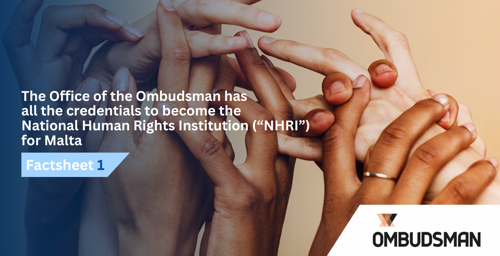
The Office of the Ombudsman has all the credentials to become the National Human Rights Institution (“NHRI”) for Malta - Factsheet 1
Published November 28, 2024
The Office of the Ombudsman has all the credentials to become the National Human Rights Institution (“NHRI”) for Malta - Factsheet 1
Published November 28, 2024

NHRIs are important institutions for the promotion and protection of human rights. They play a significant role in holding governments to account, and ensure that human rights are respected, protected, and fulfilled domestically.
As institutions that undertake sensitive functions on behalf of the public, and therefore to perform their functions well, NHRIs require independence, autonomy, and the ability to act without fear of external influence or legal liabilities. Legal protections against interference are a critical component of their independence, which is necessary for public trust in the institution.
One cannot think or speak about an NHRI without the authorities` endorsement of the Paris Principles of the United Nations.
On 20 December 1993, the UN General Assembly adopted resolution 48/134 on “National Institutions for the Promotion and Protection of Human Rights”, with an annex containing “The Principles relating to the Status of National Institutions”, better known as “Paris Principles”.
Because of that resolution, States are encouraged to set up NHRIs. States are free to decide the best type of NHRI for their domestic purposes, provided the constitution of the institution is independent in the performance of its mandate.
According to the Paris Principles, the functions of NHRIs include promotional and protection activities through the publication of reports and undertaking of investigations, advocacy, education and advice on legislation, policy and practice. Today the Paris Principles constitute internationally recognised standards.
To be fully effective, NHRIs are to have a broad mandate to deal with all human rights, a transparent method of appointment of the people to lead the institution, legal and practical independence, access to adequate funding and staff, and effective co-operation with national and international stakeholders.
NHRIs hold States to account even though they are constituted and funded by the State. They are mandated to co-operate closely with civil society. Many a time they act as bridges between civil society and the authorities, while at the same time, keeping intact their independence.
There is no doubt that strong and independent, NHRIs are a pillar of democracy, the rule of law and respect for human rights, as they provide critical assessments of policies and laws that undermine human rights, and explore innovative strategies in their work.
The Paris Principles provide that promotion is accomplished through education, outreach activities, and programming, while protection aims to prevent human rights violations.
The Paris Principles identify responsibilities NHRIs should fulfill, including:
- working to harmonise national laws with international human rights standards;
- encouraging ratification and implementation of human rights treaties;
- helping the State write reports to international and regional human rights entities;
- promoting research and education related to human rights; and
- promoting human rights values and standards by raising awareness and implementing programming.
Along with the responsibilities, NHRIs play a key role in linking international and domestic human rights systems and governments to civil society by
- Monitoring the government’s human rights policies in order to detect shortcomings and recommend and facilitate improvements;
- Promoting and teaching human rights in order to inform and engage the public; and
- Receiving, investigating, and resolving complaints of alleged human rights violations from individuals and organizations.
The Paris Principles state that an NHRI should submit to the governmental body its opinions and recommendations about legislative provision or administrative regulations, the judicial process, and any violations of human rights that may have occurred within the country.
It is important to note that an NHRI complaint process is “not a substitute for law enforcement officials or a properly functioning judiciary.” In general a ruling by an NHRI is not binding, but some NHRIs do have a mandate that grants authority to make enforceable decisions.
Please Wait
Processing
Operation Completed